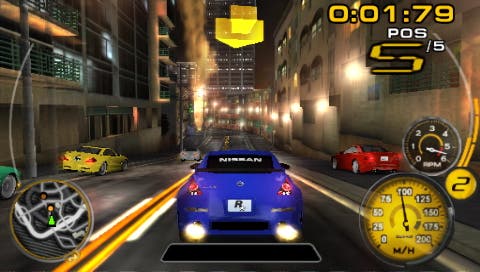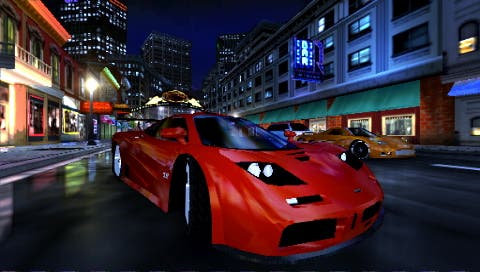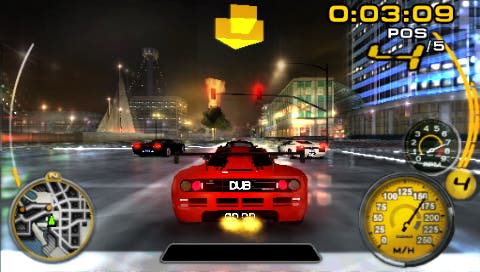Midnight Club 3
Pimp my PSP.
The PSP is truly a thing of beauty. Just holding it in your hands with the power off is entertaining enough on its own. Turn the unit on and gawp at that screen and everyone in the vicinity is compelled to stare at it, lost in the moment. It's like the future has arrived in your hands and someone forgot to announce the fact. And then you play some of the games and suddenly you're snapped back to the reality of the situation: horrendous loading times, sluggish frame rates, ill-considered conversions. This wonderful machine deserves a better fate than this.
The recent U.S. release of Midnight Club 3 PSP is a textbook example of what publishers should avoid doing. Handheld gaming is a distinct subdivision of gaming that has evolved to cater for the way people play games when they're on the move. The most successful handheld games are the ones you can pull out and have a few minute session on and always feel sated. Gamers should be able to whip out their console and be in the action within 30 seconds tops: on, skip logo, start, load, in-game. Simple as that.
Shovelware
But the grunt behind the PSP has given publishers the chance to raise the stakes and port the kind of games we're all playing at home on our lounge TVs onto a handheld format. The trouble is, in the rush to get these games onto the PSP, some publishers haven't stopped for a second to consider that shovelling exact replicas of their chart-topping hits onto a handheld isn't necessarily what gamers want - or deserve.

There are so many fundamental issues with the U.S. PSP version of Midnight Club 3 (now available from your favourite import retailer, and the version we have playtested here) that it's hard to even know where to begin. But before we go down that rocky road, let's just be clear about what Rockstar Leeds has tried to do.
The clear intent is to simply translate Midnight Club 3: Dub Edition onto the Sony handheld as faithfully as possible. And you know what? In so many hugely impressive ways it has succeeded brilliantly. It looks the same (if anything, on the razor sharp confines of the PSP it fools the eye into making it look better), with the car detail spot on, the city's gloriously represented and a myriad of lighting and reflective effects making the game look every bit as stunning as the original.
Club together
If you're clued-up about the PS2 or Xbox version you'll also be aware how much there is to do in the game, with a vast number of races spread across three real-life US cities (San Diego, Detroit and Atlanta), taking in sprints, circuit-based, point-to-point, and unordered checkpoint challenges. Factor in a whole wealth of club challenges, general street races and tournaments, tons of performance modifications and car customisations, vehicles types and manufacturers, and it's arguably the best street racing game of its type. It'll certainly take a long time to unlock everything and win every race, that's for sure.

But regardless of the fact that the game looks gorgeous, or that it's the full-blown PS2 version in the palm of your hand with all the features that come with it, that novelty soon wears off once you realise just how much time you spend watching a spinning loading icon. This isn't what handheld gaming is supposed to be about. In fact, once you factor in the amount of time it takes to load the game up from the beginning, the tedious amount of time it takes to load in a graphical representation of a car, and the 75-second load time on each and every race you're probably already halfway to your next destination. In fact most early races don't last much longer than the time it takes to load them, and by that stage you've probably lost half the enthusiasm you once had for the game. The fact that this is the finished version released to the U.S. audience is truly amazing, although Rockstar has stressed it is using the extra time between the U.S. and European launch to tweak and optimise these issues. Let's hope it does.
What really adds insult to the injury that is the U.S. PSP version of Midnight Club 3 is the questionable frame rate. Sure, it's playable enough, but the true test of any racing game is how it performs out there on the track. Not only does it feel sluggish, choppy and unsatisfying, but the overall sense of speed that coursed through the veins of the original is almost completely lost.
Elastica
And much like the original, the AI is just too damned generous. It seems no matter how badly you mess up, the elastic AI will always let you come back into the race, and steal victory. Equally irritating, even when you're doing exceptionally well you never really get that far ahead of them, so a perfect race that's marred by an untimely slip near the end can have disastrous consequences. It's a system that just isn't thought through all that well, and one that almost rewards failure more than excellence. Elastic AI: death to you.

Of course, you can eliminate the perils of CPU AI by playing the Wi-Fi mode with up to five other players. But seriously: how likely are you to ever find five other friends with a copy of this to play against? Online play is one thing, but a local network is a big ask. Needless to say, we found it impossible to test this side of the game, but for determined types you can play all of the multiplayer modes featured in the full-blown version (Tag, Capture The Flag, Ordered, Circuit, Frenzy, Unordered and Paint). Expect the same frame rate issues to blight this side of the game too, though.
On balance, there is fun to be had here, but it's fun that's better spent sat on your favourite couch playing the original. Torturing yourself with frankly ridiculous load times isn't acceptable, nor is the choppy frame rate or the sound stutters. It's important to emphasise that Rockstar is apparently working hard to optimise the game for its European release in September, but it'll have to go some distance to right the wrongs on display here.

